2019 Around the World
Righteous Protests... and Big Stakes for Humanity
| Revolution Newspaper | revcom.us
Mass outpourings of protests and resistance have broken out in a number of countries. These are in response to multiple and heightening crises, including the worldwide ascendance of fascism, increased repression and attacks against sections of people, global warming, and growing gulfs of inequality. As righteous and mainly positive as these mass struggles against oppressive states and ruling strata are, the decisive question is whether there arises within these struggles a revolutionary trend and core of genuine communist leadership that can transform them into actual revolutions—the overthrow of the reactionary system as part of going for a radically different society and world—OR whether humanity will be consigned to even more grotesque forms of misery, oppression, alienation, and perhaps even extinction.
Those are the choices, and those, nothing less, are the stakes.
As Bob Avakian said on the occasion of the Arab Spring in Egypt, in “EGYPT 2011: MILLIONS HAVE HEROICALLY STOOD UP... THE FUTURE REMAINS TO BE WRITTEN”:
“When people in their masses, in their millions, finally break free of the constraints that have kept them from rising up against their oppressors and tormentors, then whether or not their heroic struggle and sacrifice will really lead to a fundamental change, moving toward the abolition of all exploitation and oppression, depends on whether or not there is a leadership, communist leadership, that has the necessary scientific understanding and method, and on that basis can develop the necessary strategic approach and the influence and organized ties among growing numbers of the people, in order to lead the uprising of the people, through all the twists and turns, to the goal of a real, revolutionary transformation of society, in accordance with the fundamental interests of the people. And, in turn, when people massively break with the “normal routine” and the tightly woven chains of oppressive relations in which they are usually entrapped and by which they are heavily weighed down—when they break through and rise up in their millions—that is a crucial time for communist organization to further develop its ties with those masses, strengthening its ranks and its ability to lead. Or, if such communist organization does not yet exist, or exists only in isolated fragments, this is a crucial time for communist organization to be forged and developed, to take up the challenge of studying and applying communist theory, in a living way, in the midst of this tumultuous situation, and to strive to continually develop ties with, to influence and to ultimately lead growing numbers of the masses in the direction of the revolution that represents their fundamental and highest interests, the communist revolution.”
Puerto Rico:
In July, hundreds of thousands poured into the streets for weeks of determined protest, in defiance of violent police repression, and forced the ouster of Governor Ricardo Rosselló. The immediate spark of the people’s anger was exposure of the corruption of Rosselló and those around him—but this was in the context of the tremendous suffering the masses in this U.S. colony have suffered for decades and the particular outrage of how the Trump regime denied Puerto Rico needed aid after Hurricane Maria.
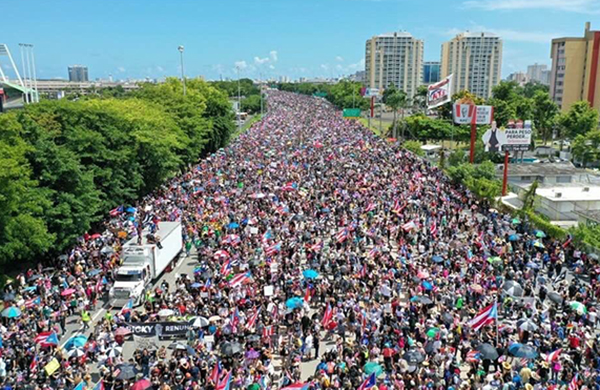
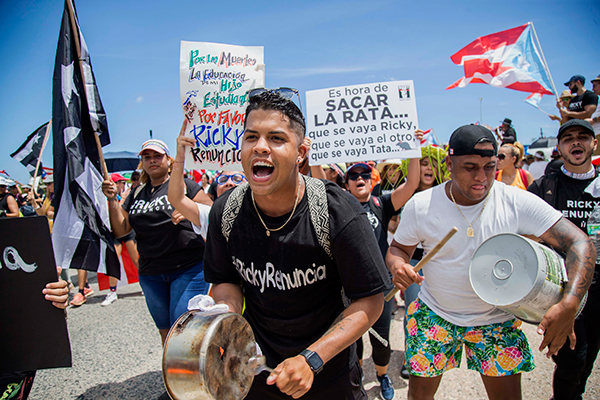 Photo: AP
Photo: APIran:
In November, hours after the reactionary theocratic regime announced steep price hikes for gas, protests quickly spread to some 100 cities across the country. Many protesters denounced not only the price hikes, which hit hard at Iranians already suffering from an economic slowdown, but the whole suffocating, oppressive rule of the regime.
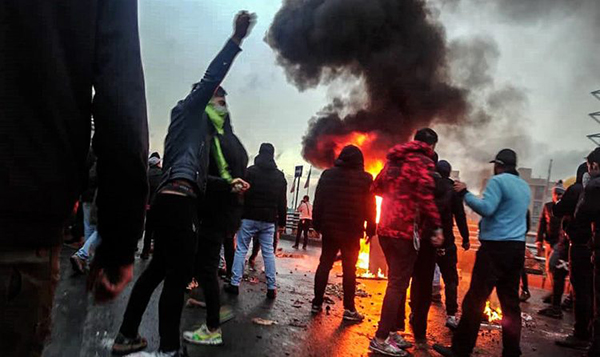 Photo: Iran-HumanRights.org
Photo: Iran-HumanRights.orgHong Kong:
Starting in the summer, huge demonstrations and occupations (including of the main airport), strikes, and clashes with the police and armed gangs tied to the government have rocked this city, a key financial center of world capitalism. Students and other young people initially took to the streets against a bill that would allow suspects to be extradited to the Chinese mainland, but soon widened into larger protests against the local government. While U.S. and British imperialists in particular are angling for influence and attempting to manipulate the struggle to their advantage, the main tendency of the struggle is righteous.
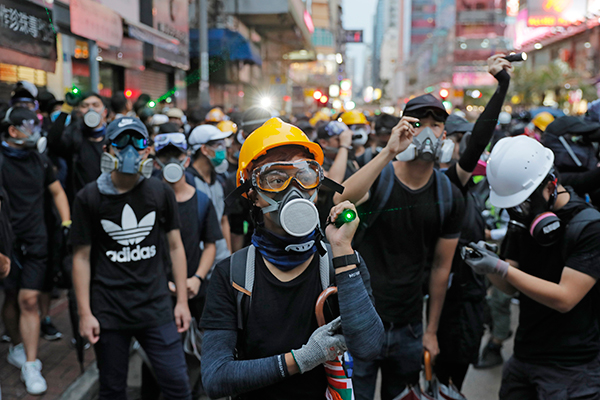 Photo: AP
Photo: APChile:
In the face of brutal repression, huge protests across the country—including a million people on October 25—sparked by a rise in public transportation fares forced the president to oust the cabinet and lift a curfew.
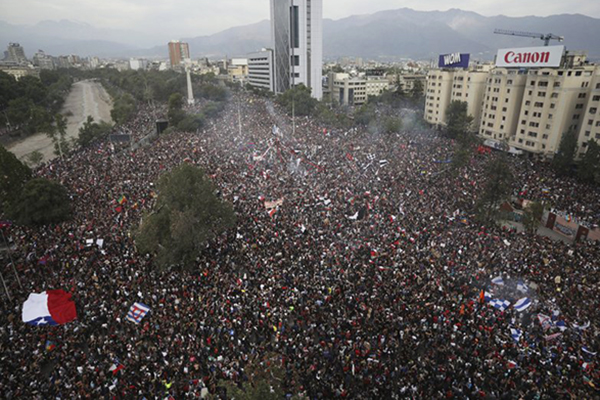 Photo: AP
Photo: APIraq:
Starting in October, people took to the streets against government corruption, unemployment, and Iranian intervention in the country—with their demands escalating to the ouster of the regime. The prime minister and the president have both submitted their resignations because of the protests.
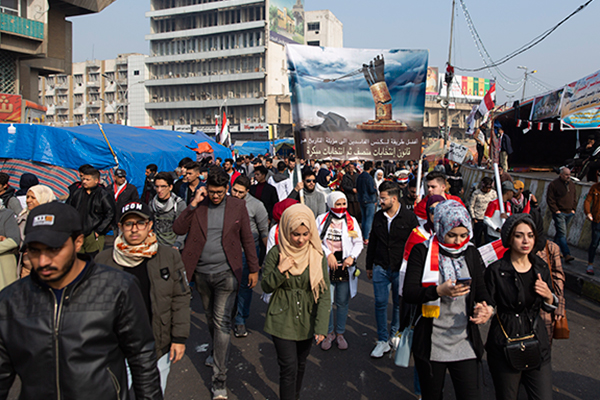 Photo: AP
Photo: APIndia:
After the fascist Modi government pushed through a law in early December aimed at further suppressing the minority Muslim population, protests involving people of different religions, and mainly young, spread throughout the country. Nearly 30 protesters have been killed by police and thousands arrested—but the protests are continuing.
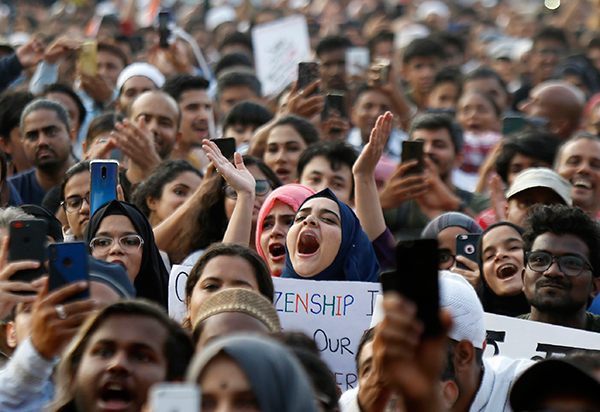 Photo: AP
Photo: APColombia:
On November 21, hundreds of thousands across the country staged a national strike, taking to the streets in protest against the repressive U.S.-backed government. Protests have continued to rock the country since then, with many calling for the ouster of the president and his right-wing regime.
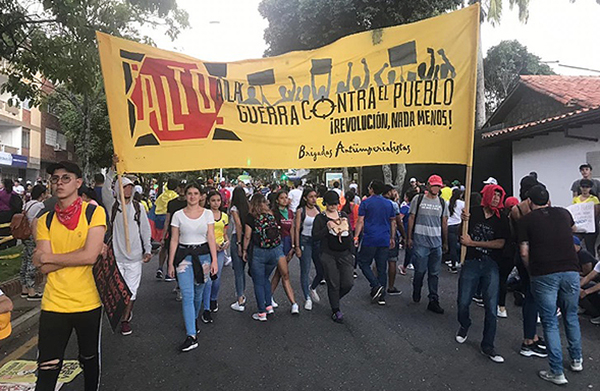 Photo: Fotogaleria
Photo: FotogaleriaAlgeria:
In February, the announcement by President Abdelaziz Bouteflika that he was running for a fifth term touched off protests that were described as largest in the country in decades. In April, Bouteflika was forced to resign.
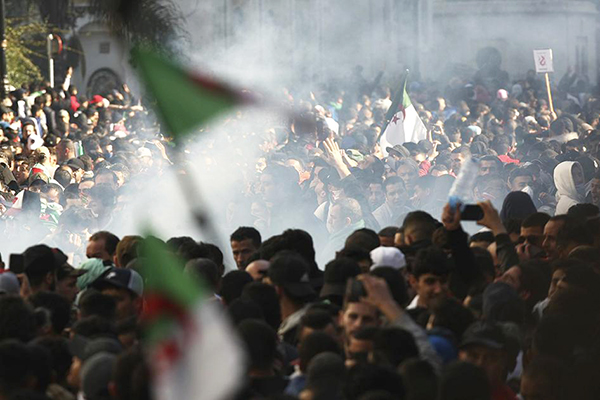 Photo: AP
Photo: APIndonesia:
Protesters—consisting mainly of students from more than 300 universities—repeatedly took to the streets in September against a new law reducing the power of an anti-corruption commission and another law criminalizing extramarital sex and defamation against the president.
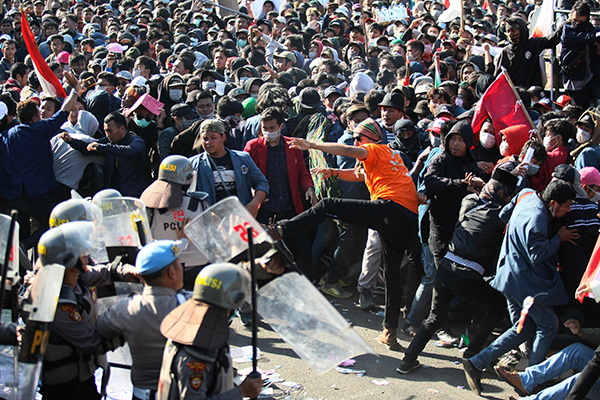 Photo: AP
Photo: APPalestine:
In March 2018, thousands of Palestinians began a weekly protest—called the “Great March of Return”—at the border fence that separates the huge ghetto known as the Gaza Strip from the oppressor state of Israel. Their demands: the right to return to the lands stolen from Palestinians when the Israeli state was created, and an end to Israel’s life-crushing blockade of Gaza. The border protests continued into the early months of 2019. Israel responded by murdering dozens of protesters and injuring thousands.
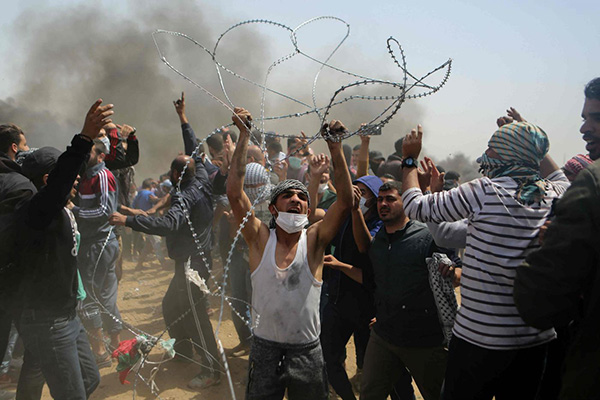 Photo: MEE/Mohammed al-Hajjar
Photo: MEE/Mohammed al-Hajjar
Get a free email subscription to revcom.us:

